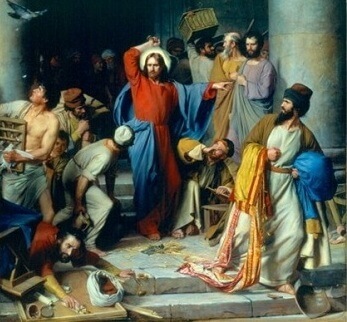 One Internet meme I’ve seen pass around every so often draws upon the incident described in the first half of today’s Gospel selection from John. It goes something like, “If someone ever asks, ‘What would Jesus do?,’ just remember that flipping over tables and whipping people is an option.” While it’s perhaps an irreverent take at Christ’s response to the vendors and money-changers who were occupying the temple, it’s pretty accurate; in addition to being fully divine, Jesus was fully human, and anger is a very human emotion.
One Internet meme I’ve seen pass around every so often draws upon the incident described in the first half of today’s Gospel selection from John. It goes something like, “If someone ever asks, ‘What would Jesus do?,’ just remember that flipping over tables and whipping people is an option.” While it’s perhaps an irreverent take at Christ’s response to the vendors and money-changers who were occupying the temple, it’s pretty accurate; in addition to being fully divine, Jesus was fully human, and anger is a very human emotion.
One thing that I’ve always thought about when I’ve read this Gospel passage is to reflect on my own church-going experience. Many times I’ve been in churches where the a hall next to the nave has been utilized by vendors selling various things: greeting cards, ornaments, popcorn, gift cards, bake sales, and the like. Or the commercial transactions have been more subtle: such as seating for fish fry dinners or registration for events.
At times as I see Boy Scouts making change as they sell another box of Christmas cards, I would get a bit uneasy. “Isn’t this pretty much the sort of thing that caused Jesus to flip tables?” I’d ask myself. Would Jesus say, “stop making my Father’s house a marketplace” to these people?
Is it the location of these events that makes them “safe”? In other words, does the fact that these folks are engaging in commercial transactions within a vestibule next to the nave make it better than if they were set up in the nave itself? Probably, at least a bit. I’m sure I’d be much more uncomfortable if the folks selling gift cards and popcorn in the parishes I’ve visited were in the nave proper, but – to be honest – I can’t envision Jesus being okay with the money-changers and vendors being right outside the temple.
Is it the presence of money itself that’s an issue? I don’t think so. Mark 12:41-44 describes a poor widow’s contribution to the treasury, and Jesus commends her, saying, “Amen, I say to you, this poor widow put in more than all the other contributors to the treasure. For they have all contributed from their surplus wealth, but she, from her poverty, has contributed what she had, her whole livelihood.” And Acts 2:42-45 describes the communal life of those early Christians, with prayer, miraculous deeds, and the divvying up money all being lumped together. The fact that the passing of the collection basket has been such an integral tradition of the Church for however-many years, I can’t imagine that the existence of money itself within the church building is the problem.
So what is? Well, take a step back for a moment. What is the purpose of money?
Can you eat it? Can you use it to clothe yourself? If you were on a desert island, would a treasure chest full of gold extend your life by a single minute?
No. It’s a tool. In the same way that a hammer isn’t a house or a needle and thread isn’t a coat; yet a hammer can be used to build a house and a needle and thread can help make a coat. And thus it is with money. Money is a tool . . . and, as the Bible notes time and again in its detailing on the need for us to be charitable and generous, money is a tool that we should be using to bring about the Kingdom of Heaven on Earth.
In this way, then, perhaps we can explain why – in my mind, at least – it’s okay that I’ve seen church buildings used in the way I’ve described. All of the usage of the church halls I’ve seen have used money and vending as a way to bring about the Kingdom. This is done directly by raising money for charity through sales, giving funds to the church when parishioners buy things they would anyway, or making money for internal church organizations for them to do their Kingdom-building tasks. It also helps indirectly by building the Christian community (in the event of fish-fry dinners or sign-up tables), in a tradition that feels very close to Acts 2:42-45 I quoted above.
It seems to me, then, that part of Jesus’ ire was directed at those who were selling, almost certainly uncaring about what they were selling so long as they had a captive audience and could turn a profit. Thus these money-changers and animal-vendors whom Jesus drove out were mingling commercial concerns with God’s temple in a way that they felt the presence of God was a useful “marketing tool” to help bring about monetary success, rather than using our monetary gifts as a useful tool to help bring about the goodness of God.
If this is so, then perhaps we need to be careful about what we buy in these circumstances, and why. It’s still possible to succumb to gluttony even if buying pies from a women’s club bake sale, or envy if you’re buying Christmas cards you can’t afford because you’re jealous that your neighbor bought a box himself. And if our thoughts drift during Mass because we’re thinking about the ornament we’re going to buy afterwards, we probably need to refocus our efforts as to why we’re at church. But, otherwise, it seems appropriate to use the financial gifts we’ve been blessed with to help foster, build, and support the Christian community.
